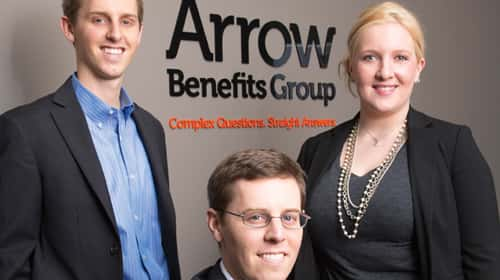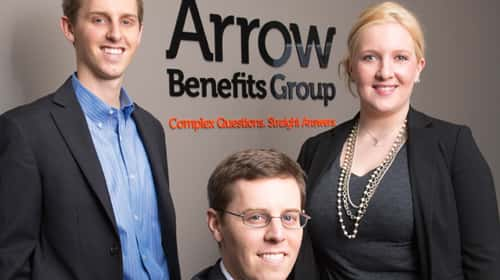“Being informed won’t help you design a competitive benefit program. Being advised will.” That’s the mission of Arrow Benefits Group, a rapidly growing employee benefits consulting firm that has won multiple awards and become a thought leader in the industry. More importantly, it helps employers and employees navigate the world of company benefits with a flexible approach.
“We are not just insurance brokers,” says Jordan Shields, senior partner of Arrow Benefits Group. “We are not just benefit consultants. We are in the employee management business, with all that entails on a continuum from pre- to post-employment.”
Currently based in Petaluma, Arrow Benefits Group began more than 30 years ago as two separate companies: McNeil Insurance founded by the McNeil family in 1978, and Jordan Shields Insurance, founded by Shields in 1985. The two Novato-based companies acted as friendly competitors until 2010, when they joined forces to build a larger insurance agency. Later, the new company purchased Shirrell Consulting Services in Santa Rosa, and in 2014, it made Petaluma its headquarters and officially changed its name to Arrow Benefits Group.

The decision to merge proved efficacious, as the company quickly grew, gained market share and brand recognition, and blossomed into the thriving business it is today. The company further evolved early this year during another merger. While management of the company did not change locally, the change allowed the firm to share resources and expertise.
“On January 1 we became a founding agency of Patriot Growth Insurance Services,” says Andrew McNeil, principal at Arrow Benefits Group. “This is a new national firm comprised of 20 other agencies in the country, designed to increase our market footprint and leverage, while retaining local autonomy.”
To further increase its footprint, Patriot Growth Insurance Services also integrated TRUE Network Advisors, a nationwide group of forward-thinking benefit-consulting firms that share best practices. As part of the agreement, Arrow kept its local name and presence.
“When you look at the [mergers and acquisitions] environment for insurance agencies, the newer model is letting people keep some autonomy in terms of their local market, their brand,” says Andrew McNeil. “Arrow has become such a large presence, in the North Bay especially, that it makes sense to keep it as opposed to changing it to something new.”
Beyond mergers and acquisitions, Arrow also has strategic partnerships with several payroll companies and PEOs (professional employer organizations), commercial insurance brokerages, and financial advisory firms. The founders of Arrow are partners in a human resources consulting firm, The Personnel Perspective, and Arrow also owns a local third party administrator (TPA), with its purchase of Shirrell Consulting. The TPA’s dental department has a proprietary local and separate national network. These strategic relationships and programs are designed to provide significantly more breadth and depth than a traditional benefits firm.
Thinking outside the box
Arrow Benefits Group prides itself on being a full-service, employee benefits firm that offers every type of conventional insurance to employers, such as medical, dental, vision, disability, and life insurance. But it also helps clients identify their needs and translates their goals into a workable solution. Through plan administration, benefit design, and compliance, Arrow helps employers do what is best for them and their employees, and ensures that their benefit plans are fully-understood, appreciated and meaningful to those they’re meant for.
“From an approach standpoint, we are a fountain of ideas and not afraid to try something new,” says Stephen McNeil, managing partner. “We are exceedingly nimble in this regard, which makes us a great partner with clients that may require outside-of-the-box solutions. ‘First BBs, then cannonballs,’ is a mantra I think of often. We will try something on a small scale, and if it seems to evoke a good response, we then put more focus and energy behind it.”
Arrow doesn’t outsource its administration, which gives greater quality and pricing control. By doing so, the firm can go beyond conventional offerings and include what most other firms don’t such as COBRA, self-funded dental, commuter reimbursement, cafeteria plans and health reimbursement arrangements.
“We have experienced a fundamental shift in attitude, directed by a trend toward more personal and meaningful direct employee communications,” says Shields. "Being in the employee management business, we are not only a trusted advisor to help employers with the Four Cs—culture, compensation, compliance and communications—but also require an intense focus on the employees. This reinforces and enhances the corporate culture and messaging. Our work includes the use of financial wellness to educate employees on the various aspects of their benefits and financial and legal planning they will require to better protect their families. So we advise at the management level and then advise those who are being managed"
Arrow continually strives to be cutting edge in providing services for their clients. It recently established “BenefitsTV,” which allows the firm to continually post videos on important benefits topics that are short, to the point, and can be customized to employers.
“The videos are purely informational,” says Andrew McNeil. “That allows us to constantly stay in front of our clients and our prospective clients in a non-threatening, non-pushy, or salesy way. Our attitude is that we have to be outside the box because our industry is in the box. In order to be different and get through to people, it’s products like Benefits TV.”
Another point of differentiation is their Spanish division. Arrow Benefits Group is the only employee benefits consulting firm in the country that has a division dedicated to the Hispanic community, which is especially important in California. Those who speak Spanish as their primary language have been largely underserved in the benefits community, and employers who hire a Spanish-speaking advisor to help educate their employees see a large increase in participation, utilization and appreciation of their benefit plans.

“The main focus is the educational piece,” says Rosario Avila, senior benefits advisor and Spanish language division lead for Arrow Benefits Group. “There’s the language barrier in itself, but going into insurance lingo is a separate issue. What we find with employers is they think if they have a translator that’s enough, but what they don’t understand is that culturally, in Latin America, some insurance doesn’t exist. So when a translator comes in and talks about insurance and their deductible and co-pays, an employee may not know what a deductible is. They don’t understand what an in-network provider is. When we go out and talk to the employees we start with the basics: what insurance is, how it works, what a PPO is and what an HMO is. They get that understanding of how it works. We get more of a response from the employees—it becomes more of a conversation. Then there’s more appreciation of those benefits.”
Creating the Spanish division is one of many ways Arrow has recognized how to serve clients better. Some clients are pleasantly surprised that offering the best benefits does not always mean spending more money. Arrow attempts to get to know the culture of each company it works with to understand what employees want and need, which could also include benefits like flex time, telecommuting options, and other non-monetary values. In doing so, the employer is more competitive in the marketplace in terms of recruiting and retaining its best employees.
“Arrow has been great at seeing not just what is beneficial for the company, but what services we are giving,” says Avila. “We look at how we are helping the clients, how we are helping the companies. It’s not just benefits related. Arrow focuses on the culture of a company. Because of that focus we’re able to see the needs not only with clients, but also within the community. And that is what Arrow is big on.”
Indeed, the company also practices what it preaches. Arrow annually contributes to several organizations and sponsors local fundraisers and events. The company also matches employee contributions to charitable organizations that are important to them and provides staff with paid volunteer time to support local organizations. In addition, the firm allocates $100,000 to place life-saving AED (automated external defibrillator) machines in businesses throughout the community and facilitates free CPR and first-aid classes to its clients and the community.
“That’s been something that has been carried over from the Shields’,” says Andrew McNeil. “Jordan has been involved in Big Brothers and Big Sisters for about 30 years. Being involved with the community has been a strong cornerstone for what we do and how we do it. Philanthropy has been really important for us, especially in the North Bay where people put a lot of value on that.”
Understanding the trends
Having been in business for more than thirty years, the founding partners of the firm have seen a lot of changes over that time period, including legislative changes such as the Affordable Care Act, COBRA laws, flex-plan laws, HIPAA (The Health Insurance Portability and Accountability Act), and health savings accounts. However, benefit plans themselves have not changed dramatically. HMOs were around in the 1970s, PPOs came in the 1980s, and today there is the proliferation of high-deductible HSA plans.
“For many years, it was all straightforward indemnity programs, and medical morphed into the ancillary lines of dental and vision while disability and life went from individual to group plans,” says Shields. “We have gone from one simple plan design to the formation of HMOs, PPOs, and some models that have come and gone, like point of service plans. We have added plan choice and a different model of health-care delivery. This then went full circle to a disintegration of some of the tools and services and resources, but now they are being integrated again with carriers inserting themselves in the ownership of pharmacy benefit managers, lab networks, etc. The latest trend is a movement toward direct primary care management, a move potentially away from carriers, who may eventually outlive their usefulness.”

In general, over the past decade-plus, health benefits have decreased while premiums have increased. In 2005, Anthem Blue Cross created a high deductible health plan that was much less expensive than a traditional PPO with an out-of-pocket limit of $1,500. In the following 14 years, that amount has increased drastically for similar plans, rising to as much as $7,550.
Technology has increased since Arrow was established, as well. It’s changed the way people work and ushered in benefits that didn’t exist before. Telecommuting and flextime were not routinely offered decades ago as they are today.
“The Internet has opened that up,” says Andrew McNeil. “For example, our marketing communications manager does all our graphics and proposals from Salt Lake City, Utah. When we hired her, she lived in Sonoma County, but they moved for her husband’s job.” McNeil explained Arrow’s philosophy is to keep its best employees, and technology assists with that greatly.
The future of benefits consulting
As legislation changes, benefit plans and products change, and costs continue to escalate, one constant is the need for creative solutions which a broker—moving into a role of a trusted advisor—can relay as part of the management and decision making team.
“Most consulting today is product-based, meaning how to compare packaged fully-insured products,” says Keith McNeil, partner. “Many employers are large enough to consider alternate funding options, which are various forms of partial self-insurance with stop-loss insurance for risk management. Leaving aside the cost-saving potential under such plans, it allows the employer or plan sponsor to be much more creative, with more than 200 vendors that we track to focus on niches in the areas of drug costs, medical billing error detection, medical provider quality data, musculoskeletal treatment management, expert independent second opinions from recognized experts, etc.”
Currently, Arrow is completing the creation of a specialized pooled stop-loss plan, open to all brokers, which will provide real long-term protection to employers that are unlucky enough to have catastrophically large on-going claims for conditions such as hemophilia.
“The stop-loss market currently is largely AWOL on this issue, which puts most self-funded employers at severe risk in a worst-case scenario,” says Keith McNeil. “We prepare a stress test to show how the current or proposed stop-loss plan fares over a four-year period compared to what we call a Gibraltar plan with long-term protection built in.”
Despite the sometimes difficult and complex world of employee benefits, employers must remember there are always different ways to look at certain circumstances, better ways to manage strategies, and more to be expected from carriers, providers, employees and consultants.
“This should come as no surprise, but it often does, and we capitalize on this with clients by continuing to challenge them, their assumptions and their employees to gain greater understanding, assume more responsibility, and realize that a lot of what happens is not beyond their control,” says Shields. “Einstein said ‘Out of intense complexities intense simplicities emerge.’ Employers would be surprised that, when properly guided along the four channels of the Four C’s—culture, compensation, compliance and communications—how simple it is to formulate a strategy, implement the plan, and engage employees in its execution and continuation, until they have to change it again.”
As is the case with everything, change is imminent and unavoidable. Laws, regulations, and standards change, new products enter the marketplace, and strategies and operating procedures evolve. It can be difficult for employers to keep up. Fortunately, there are companies like Arrow to help navigate the changing intricacies of employee benefits.
“Over the next five years, two things in our marketplace are certain: health-care costs will continue to rise and compliance requirements for employers will increase,” says Stephen McNeil. “The role and expectation of a benefits broker will continue to evolve as employers look for support. Arrow will continue to proactively anticipate and meet the emerging needs of our clients. The needs of our clients will change; our approach to effectively meet them will not.”




